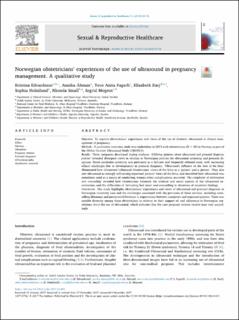Norwegian obstetricians' experiences of the use of ultrasound in pregnancy management. A qualitative study
Edvardsson, Kristina; Åhman, Annika; Fagerli, Tove Anita; Darj, Elisabeth; Holmlund, Sofia; Small, Rhonda; Mogren, Ingrid
Peer reviewed, Journal article
Published version

Åpne
Permanent lenke
https://hdl.handle.net/11250/2755098Utgivelsesdato
2017Metadata
Vis full innførselSamlinger
- Institutt for samfunnsmedisin og sykepleie [3668]
- Publikasjoner fra CRIStin - NTNU [38289]
- St. Olavs hospital [2536]
Sammendrag
Objective
To explore obstetricians’ experiences and views of the use of obstetric ultrasound in clinical management of pregnancy.
Methods
A qualitative interview study was undertaken in 2015 with obstetricians (N = 20) in Norway as part of the CROss Country Ultrasound Study (CROCUS).
Results
Three categories developed during analyses. ‘Differing opinions about ultrasound and prenatal diagnosis policies’ revealed divergent views in relation to Norwegian policies for ultrasound screening and prenatal diagnosis. Down syndrome screening was portrayed as a delicate and frequently debated issue, with increasing ethical challenges due to developments in prenatal diagnosis. ‘Ultrasound’s influence on the view of the fetus’ illuminated how ultrasound influenced obstetricians’ views of the fetus as a ‘patient’ and a ‘person’. They also saw ultrasound as strongly influencing expectant parents’ views of the fetus, and described how ultrasound was sometimes used as a means of comforting women when complications occurred. ‘The complexity of information and counselling’ revealed how obstetricians balanced the medical and social aspects of the ultrasound examination, and the difficulties of ‘delivering bad news’ and counselling in situations of uncertain findings.
Conclusion
This study highlights obstetricians’ experiences and views of ultrasound and prenatal diagnosis in Norwegian maternity care and the challenges associated with the provision of these services, including counselling dilemmas and perceived differences in expectations between caregivers and expectant parents. There was notable diversity among these obstetricians in relation to their support of, and adherence to Norwegian regulations about the use of ultrasound, which indicates that the care pregnant women receive may vary accordingly.
